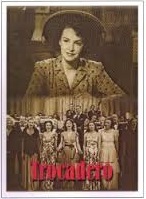Movie Review: Trocadero (1944)
Hollywood columnist Erskine Johnson (playing himself) needs a story for his Sunday slot, and goes to his favorite nightclub, the Trocadero. It’s hopping as usual, but headwaiter Sam (Ralph Morgan) finds a moment between celebrity cameos and musical numbers to talk to the columnist. He reveals that things were not always so rosy here….
The club used to be Tony Rocadero’s Restaurant, and we see the owner (Charles Calvert) at the end of Prohibition getting a legitimate liquor license. He wants to turn his place into a class joint for the sake of his adopted children Judy and Johnny Edwards (Rosemary Lane & Johnny Downs.) Unfortunately, he is killed in a street accident. There’s only enough income from the restaurant to send one of the kids to college; the other will have to stay and help manage the place.
Johnny goes off to earn a degree while Judy takes over as acting manager and star singer of the night spot. They struggle along until in 1935, the place is broke and about to close its doors. Musical agent Mickey Jones (Sheldon Leonard) buys ten percent of the business as he’s convinced it can be revived with a new jazz band he’s representing. Even this might not have worked, but then swing band leader Spike Nelson (Dick Purcell) barges in with his own musical troupe, and Judy takes the risk of having two house bands.
It’s obvious that both Jones and Nelson have more than a business interest in Judy, but she’s got a nightclub to run. A slip of the tongue renames the place the Trocadero, it shifts emphasis from dining to dancing, and business heats up.
Some time later, Johnny has finally graduated from college, and returns. Problem! He’s fallen in love with society dame Marge Carson (Marjorie Manners), whose father (Emmett Vogan) owns a tobacco brokerage. She’s less than enthused by the tawdry entertainment industry, and wants Johnny to join her father’s business. So he can’t take over the Trocadero after all.
Judy has her own problems. Jones is more or less okay with just being friends, but Nelson feels he’s been strung along too long and accepts another gig. Only after he leaves does Judy realize that she actually loves the lug.
Meanwhile, Johnny discovers at the engagement party that Marge’s relatives are deadly dull people who care only for money and prestige, and look down on “hoofers” like himself. He dances a fiery rebuttal and calls off the marriage. He returns to the Trocadero to console his lovelorn sister and finally help manage the place, which is more popular than ever.
Which brings us back to the present day. But this is a Hollywood musical, and there’s no way it’s going to end on a bittersweet note.
There was a real-life Trocadero nightclub, one of Hollywood’s hottest spots, but its history was nothing like this movie’s version. Still, it’s a sweet story in its own way, a fantasy of making it in show business. There are several fun musical numbers, including a grand finale with four, count ’em, four bands combining their talents. One song in the modern section obliquely references World War Two, which was going on at the time.
As mentioned, there are several celebrity cameos, the most unusual of which is animator Dave Fleischer, with a little cartoon creature that comes out of his pen.
There’s of course lots of drinking, but the cigarette girl isn’t too keen on smoking (at least the Carson brand.) Johnny and Judy do some playful scuffling, and have perhaps a bit too much chemistry for siblings, but that and the slightly offscreen death of Tony are it on the violence front. By 1940s standards the movie is surprisingly non-sexist; no one thinks Judy can’t run a nightclub just because she’s a woman.
This is a lovely confection, fun but not very deep, and should be okay to watch with younger viewers.

